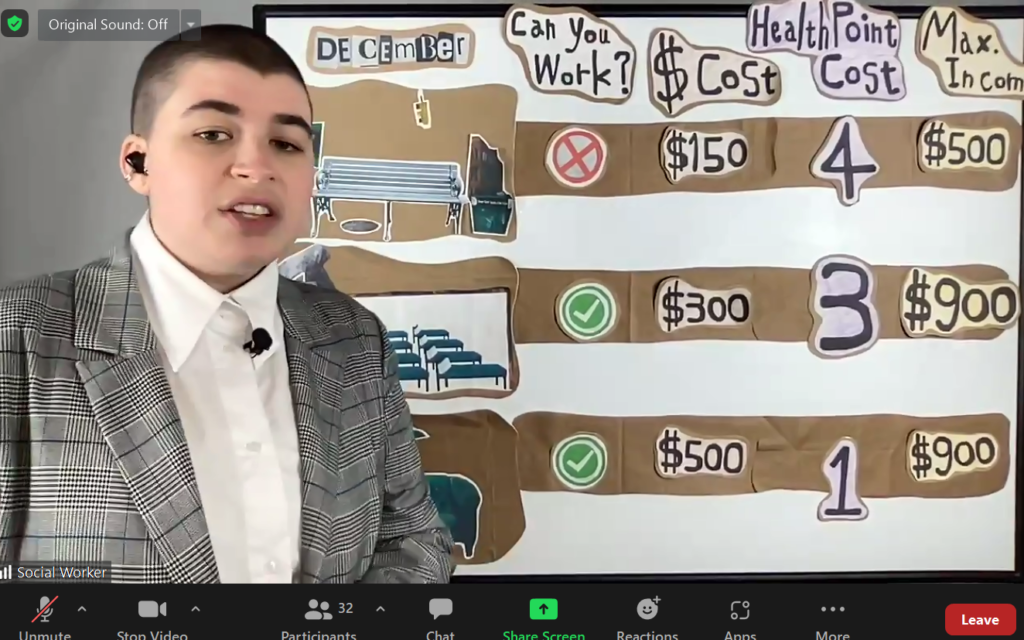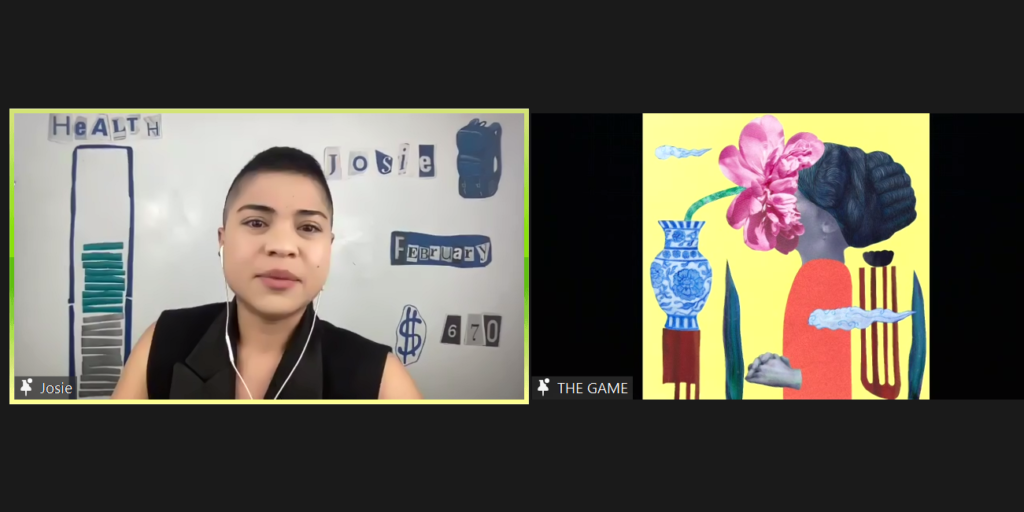
A screen grab from “Addressless.” The cast discusses their options.
Presented by Rattlestick Playwrights Theater
Community partnered with Urban Pathways, Community Access
Adapted from STEREO AKT‘s and Lifeboat Unit’s Hungarian production of Addressless.
Created & directed by Martin Boross
Written by Jonathan Payne
Script consultants: Hope Beaver, Cassie Desalines, Shams DaBaron aka “Da Homeless Hero”
Video editing by Matthew Russell
Graphics & animation by Maiko Kikuchi
Streaming technician: Keenan Hurley
Featuring: Joey Auzenne, Hope Beaver, Shams DaBaron a.k.a. “Da Homeless Hero,” & Bianca Norwood
Thursday, January 13 – Sunday, February 13, 2022
Presented over Zoom
Tickets
Digital Program
Rattlestick on Facebook
Content warnings: Addressless discusses at length issues faced by the unhoused community such addiction and sobriety, bigotry, sex trafficking, shame, government benefits programs, and other forms of abuse. This show can be intense. It may not be appropriate for children under 12.
Critique by Kitty Drexel
ZOOM — Addressless is heart-breakingly honest digital theatre. If you’re looking for something to take you out of the monotony of COVID-living, creators Boross and Payne have a solution for you. Their two-hour, interactive, roleplaying theatre game is a reminder that life’s struggles don’t end just because there’s a pandemic at your door.
This production begins like any other over Zoom: the host invites attendees in, we wait patiently for the show to start. Addressless is slightly different because it asks attendees to fill out a survey via a link in the chat. The survey asks participants personal questions about their identity, financial situation, and if they’ve ever been unhoused. Have you lived on the streets? For how long?

Hope Beaver, the Social Worker, explained the rules to us. Screen grab by Kitty Drexel.
Audience members are put into three groups. These groups work directly with an actor playing a character that experiences homelessness: Wallace (Shams DaBaron a.k.a “Da Homeless Hero,” he/him), Louis (Joey Auzenne, he/him), or Josie (Bianca Norwood, they/them).
My group worked with Josie, a queer teen who moved to New York City to escape an untenable living situation. We got to know Josie. In turn, Josie relied on us to help her make important, life-altering decisions throughout the game. We had to trust each other to do what was best for Josie.
Hope Beaver (she/her), a social worker and game hostess explained the rules to us. Each character had $500 to start. They needed to make $1,500 in three months to qualify for low-income housing.
The Zoom audience decided if the characters lived on the streets or elsewhere, if they got a job or panhandled, or even if they spent the night with an amorous friend or with their hand. Each choice costs money. Some decisions meant the difference between dignity and survival.
It was incredibly stressful making group decisions on Josie’s behalf. We argued because we cared about her wellbeing. We felt proud when Josie was able to make money from selling her art. We felt relief when she avoided violence.

Josie sold some of her artwork! The audience bid on it. Screen grab by Kitty Drexel.
Actor Bianca Norwood was sincere and gracious as Josie. They, DaBaron and Auzenne played their characters with great sensitivity and respect for the population they represent.
Social worker Hope Beaver was generously compassionate and professional in her role too. She provided invaluable coaching to the audience. We would’ve been lost without her.
It was difficult to remember that Norwood was only an actor. In a question and answer section right before the performance ended, Norwood told our group that Josie was created from an amalgamation of experiences that homeless kids face. They are but the face of a problem endemic to the US.
Addressless wasn’t just a well-streamed performance that seamlessly incorporated animation effects and pre-shot video into a Zoom experience, it was also a tutorial. It is incredibly expensive to be poor. The theatre game showed us why and how. Hopefully, activism can change the hearts and minds of the people who attend a performance. It will take everyone’s help to eradicate homelessness.
Every community has an unhoused population. Fortunately, homelessness is a problem with an actual cure. Homes. Addressless convinced us to care about an unhoused young, queer woman living on the streets of New York. I’m hoping New England residents will see this production and extend their compassion to the unhoused community living in our own communities.
